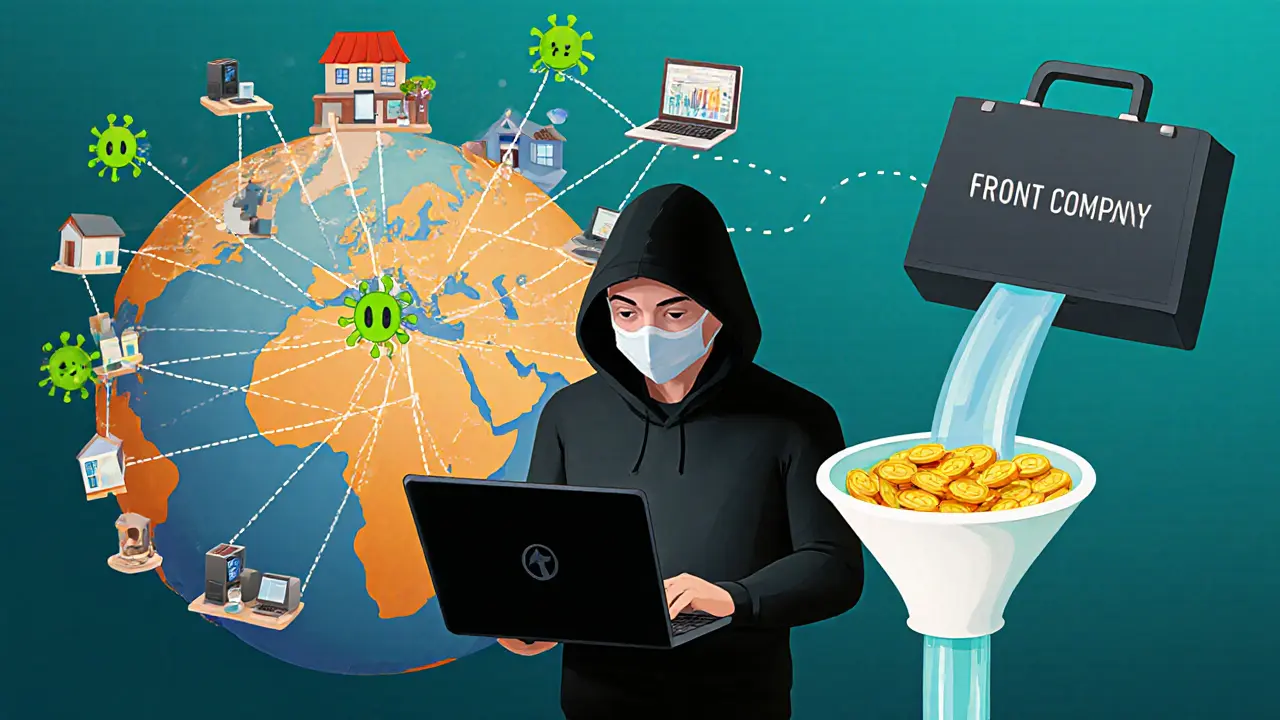Weapons Funding Calculator
How Stolen Crypto Funds Weapons
Based on U.S. Intelligence Community data (2025) showing North Korea stole approximately $3 billion in cryptocurrency between 2017-2023 to fund weapons programs.
When you hear about North Korea's cryptocurrency theft operation is a state‑run hacking network that siphons digital assets to keep the regime’s weapons programs alive, the first question is usually "how does this even work?" The answer lies in a mix of high‑tech crime, weak regulation and a relentless need for cash. In the past eight years the operation has moved roughly $3billion of stolen crypto, turning invisible coins into concrete parts for missiles, nuclear tests and other weapons of mass destruction.
Why crypto matters to the regime
Traditional sanctions choke off bank transfers, oil sales and luxury imports. Digital tokens, however, travel on a peer‑to‑peer network that bypasses banks entirely. That makes them an ideal lifeline for a country cut off from the global financial system. Each time a hacker cracks a wallet, the regime can instantly convert the loot into cash, purchase components for a missile or pay scientists working on a new warhead.
The scale of the loot
- 2017‑2023: estimated $3billion stolen in 58 confirmed attacks (U.S. Intelligence Community, 2025).
- Average yearly haul: $350‑$400million, enough to fund a single solid‑fuel rocket launch.
- Recent Bitcoin movement: over $40million held in six wallet addresses linked to the TraderTraitor group.
These figures are not just headlines; they translate into real hardware. Analysts trace a direct line from stolen funds to the launch of the Hwasong‑15 missile in 2017 and the continued development of the K-5 ballistic missile.
Three ways the regime extracts crypto
The operation isn’t limited to a single tactic. It uses a trio of methods, each with its own risk‑reward profile.
| Method | How it works | Annual yield (est.) | Key challenges |
|---|---|---|---|
| Mining | Operating GPU/ASIC farms to solve blockchain puzzles | Under $10million | Electricity shortages, low efficiency |
| ICO fraud | Launching a fake token sale, collecting investor funds | ≈ $5million (Marine Chain, 2018) | Regulatory crackdowns, limited trust |
| Cryptojacking & theft | Hijacking computers or hacking exchanges, then laundering via mixers | $300‑$400million | Detection by cybersecurity firms, constant technique upgrades |
Cryptojacking is by far the most lucrative, accounting for more than 90% of the total proceeds.

The Lazarus Group’s central role
Behind the scenes sits the infamous Lazarus Group (also known as APT38). This elite hacking unit reports directly to the regime’s primary foreign intelligence office. Their playbook includes:
- Infiltrating crypto exchanges with fake résumés and video interviews.
- Deploying phishing campaigns that steal private keys.
- Running supply‑chain attacks against wallet providers.
In one high‑profile case, Lazarus operatives posed as Canadian IT consultants, passed background checks, and gained admin access to a major exchange’s hot wallet. From there they moved 1,580bitcoin-worth roughly $60million at the time-into the six addresses listed earlier.
How stolen coins are hidden
Direct transfers would instantly flag sanctions‑watch lists. The regime therefore uses crypto mixers is a service that pools multiple transactions and redistributes them, breaking the link between source and destination. A typical laundering chain looks like this:
- Hacked wallet sends Bitcoin to a mixer.
- Mixer blends it with legitimate funds from other users.
- Cleaned coins exit to a wallet controlled by a front company.
- Cash‑out via peer‑to‑peer platforms or unregulated exchanges in jurisdictions with lax AML rules.
Because mixers operate on decentralized protocols, law‑enforcement agencies often lack the legal authority to compel data disclosure, giving the North Korean network a sturdy veil.
International response
Governments are aware, but the decentralized nature of crypto makes a unified front difficult.
FBI is the U.S. federal agency leading investigations into the crypto thefts. Their recent 24‑hour tracking reports show constant movement of stolen Bitcoin, prompting public alerts to exchanges worldwide.
United Nations is the multilateral body that monitors sanctions compliance and publishes investigative reports on DPRK cyber activities. UN experts have logged 58 attacks between 2017 and 2023, all linked to weapons financing.
U.S. Treasury is the department that enforces sanctions and offers rewards for information. It has pledged up to $15million for tips leading to the disruption of DPRK crypto networks.
Congressional pressure has also mounted. Senators Warren and Reed have urged the DOJ to pursue the recent Bybit hack is a $200million cryptocurrency exchange breach attributed in part to North Korean actors as a test case for tougher enforcement.

Why the threat persists
Three factors keep the operation alive:
- Regulatory gaps: Many jurisdictions still lack clear AML rules for DeFi platforms, giving hackers safe harbors.
- Technical agility: The Lazarus Group constantly upgrades its social‑engineering toolkit, learning from each takedown.
- Economic necessity: The regime’s missile and nuclear programs consume billions annually; crypto remains one of the few untapped revenue streams.
Even as blockchain analytics improve, the network adapts by using privacy coins, layer‑2 solutions and cross‑chain bridges.
Looking ahead
Experts predict the loot will keep growing, especially as new token standards emerge. The next wave may involve automated smart‑contract exploits that siphon funds directly from decentralized finance platforms.
For defenders, the recipe is simple: combine real‑time monitoring, aggressive takedown of mixers, and tighter AML compliance for crypto service providers. International coordination-like the trilateral working group between the U.S., Japan and South Korea-will be essential.
Frequently Asked Questions
How does North Korea convert stolen crypto into cash?
After laundering through mixers, the regime moves the clean coins to wallets owned by front companies. Those wallets then use peer‑to‑peer platforms or unregulated exchanges to trade the crypto for fiat currency, which can be moved through shell banks or cash‑intensive businesses.
What makes cryptojacking more effective than mining?
Mining requires massive electricity and hardware investment-luxuries North Korea lacks. Cryptojacking hijacks existing computers worldwide, turning anyone’s device into a miner without needing local resources, and yields far higher returns.
Which crypto exchanges have been targeted?
Public reports name Binance, Bybit, and several smaller regional platforms. The attackers often gain internal credentials through fake job applications, then move funds from hot wallets to external addresses.
Can crypto mixers be regulated?
Regulators can require mixers to register as money‑service businesses and implement KYC checks, but many operate on decentralized protocols that evade jurisdictional reach, making enforcement tricky.
What steps can individuals take to protect themselves?
Use hardware wallets, enable two‑factor authentication, avoid clicking unknown links, and keep software up to date. If you suspect your machine is being used for cryptojacking, run a reputable anti‑malware scan.



Comments
It is indefensible that a regime so isolated should resort to cyber‑theft to fund weapons of mass destruction, especially when innocent investors are deceived and stripped of their savings. The moral bankruptcy displayed by state‑sponsored hackers eclipses any justification rooted in political grievances. Moreover, the international community bears responsibility to tighten sanctions and hold perpetrators accountable. Yet the persistent gaps in regulation allow these crimes to flourish, highlighting a collective failure.
While the technical ingenuity behind the crypto heist is impressive, the ultimate purpose of arming a hostile regime is deeply troubling. It underscores the need for cooperative cybersecurity frameworks that respect privacy yet prevent abuse. Nations should share threat intelligence to disrupt such pipelines before they fuel further weaponisation.
Yo this is like the biggest crypto robbery ever bro making them fund rockets lol
Sure, let’s applaud a rogue state for being so “innovative” – it’s not like we have any real problems of our own 🙄
Great, another excuse for sanctions‑hardened countries to ignore the real issue.
Yep, just another scummy crypto playground for bad guys.
I understand the frustration people feel when they hear about stolen funds hurting ordinary investors. It’s important to remember that behind every wallet are families who trusted the system. Supporting stronger consumer protections can help prevent such losses in the future.
Listen up, folks – this is a wake‑up call! The hackers didn’t just steal money; they stole a piece of our trust. But we can bounce back if we stay informed and demand better security from exchanges. Together, we can turn this nightmare into a lesson that makes the crypto world safer for everyone.
Honestly, i think the whole situation shows how fragile the whole system is. When a government can just hack and launder billions, it makes you wonder what else is out there. Maybe it's time to push for more transparent blockchain analytics and stricter KYC rules, even if it feels like a hassle for everyday users.
From a forensic standpoint, the laundering chains employed by the DPRK actors illustrate a sophisticated use of mixing services that exploit the lack of mandatory reporting in several jurisdictions. Their ability to dynamically route funds through multiple layers reduces traceability, which is why traditional takedown methods often fall short. Enhancing cross‑border data sharing agreements could mitigate this gap.
Totally agree! The tech is wild, but with the right tools we can stay ahead 😎
The West should stop whining about crypto theft and focus on its own fiscal irresponsibility. If we diverted resources from massive defense budgets, maybe we’d have less need for rogue states to fund weapons in the first place.
The ethical breach represented by North Korea's cyber‑theft is a stark reminder of how technology can be perverted for nefarious ends. Stealing from unsuspecting investors violates the fundamental principle of consent that underpins any financial system. Moreover, the use of those stolen assets to finance weapons of mass destruction amplifies the moral outrage beyond mere financial crime. It demonstrates a calculated strategy to weaponize the very freedoms that open‑source innovation promises. When a regime chooses illicit hacking over legitimate economic development, it signals a profound lack of legitimacy. International sanctions are insufficient if the global community does not enforce stringent anti‑money‑laundering standards. The proliferation of mixers and privacy‑enhancing tools only complicates detection, but it does not absolve the perpetrators of responsibility. Every bitcoin laundered through a mixer represents a step closer to a missile launch or a nuclear test. The human cost of such weapons, in terms of potential loss of life, cannot be ignored. By turning stolen crypto into war material, the regime creates a direct link between digital theft and physical devastation. It is incumbent upon regulators, exchanges, and users alike to adopt zero‑tolerance policies toward illicit flows. Transparency reports from exchanges should be mandatory, and non‑compliant platforms must face penalties. Collaborative intelligence sharing among allied nations can disrupt the financial pipelines that sustain the arsenal. Ultimately, moral clarity demands that we treat cyber‑theft as a national security threat, not merely a cybercrime. Only then can we hope to diminish the resources that fuel such dangerous ambitions.
The pursuit of destructive capabilities through stolen digital wealth raises profound questions about the nature of power in the modern age. When financial sovereignty is compromised, the line between virtual and physical aggression blurs, prompting us to rethink traditional security paradigms.
Analyzing the transaction patterns reveals that the Lazarus Group often exploits low‑liquidity tokens to obfuscate the trail. Their emphasis on rapid conversion minimizes exposure and maximizes operational efficiency.
The evidence shows that each stage of the laundering process-from initial cryptojacking to final fiat conversion-is meticulously orchestrated to evade detection. This systematic approach mirrors traditional organized crime syndicates, only with a digital veneer. Countermeasures must therefore combine cyber forensics with financial regulatory enforcement.
Honestly, this kind of theft just shows how messed up the world is.
We need to channel our frustration into real action-push for stronger anti‑mixing regulations and support victims in reclaiming their losses.
It is a reminder that technology alone cannot safeguard society; ethical frameworks must evolve alongside.
What if the whole “mixing” narrative is just a distraction, and the real money trail leads to shadow banks in places the press won’t mention? The elites might be laundering their own gains under the guise of a rogue regime.
The data underscores the necessity for a multi‑layered defense strategy, integrating technical monitoring with diplomatic pressure. By aligning policy with technology, we can reduce the risk of funding illicit weapon programs.
Hey folks, let’s not forget that while we’re busy pointing fingers, the real victims are everyday traders who lose faith in the system. If we keep pushing for better security standards, maybe we can prevent the next big heist.
It is both tragic and alarming to witness how a nation can manipulate cutting‑edge technology for destructive ends, thereby challenging the very principles of peaceful digital innovation.
In light of these revelations, it is imperative that the international community convenes a summit to address the nexus between cybercrime and weapons proliferation, establishing binding protocols that hold perpetrators accountable across borders.